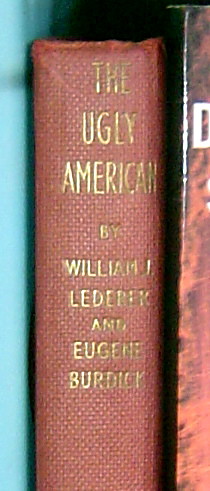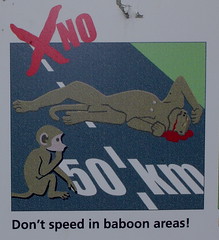The Ugly American II
Continuing my ramble from yesterday, I guess I should say that in the limited time that I've spent overseas, it's been rare to actually encounter an ugly American. Maybe the ones who would be inclined to be ugly, to yell out ''English, por favor,'' in a crowded restaurant rarely get a chance to inflict their brand or ignorance on the world these days. The majority of Americans, you know, don't even have a passport.
It's like a waitress in our restaurant told us once: she enjoys talking to all the American ex-pats she meets, but hasn't spoken to a single one who was prepared to defend our foreign policy. She loves Americans, dreams of visiting New York and standing amid the bustle of Broadway, but despises our government. If every American she talked to felt the same way, she asked, how come Bush was re-elected?
 She shuttered. God, she said, she hated George Bush.
She shuttered. God, she said, she hated George Bush.
Of course, as I told her, just about anyone who would make the 24-hour (at least) plane flight to southern Africa, who would deign to speak to someone from these parts, was curious enough about the world, and modest enough about their own place in it, to not insist on inflicting their ways unthinkingly on everyone else.
By way of contrast, let us pause for a word about the British. If what we are talking about here is the attitude that the world revolves around you, that your ways are the only ways that a civilized country should work, then oh, my, let's talk about the Brits. In Turkey, in Peru, even in France, Katie and I have encountered some honest-to-God legitimate neo-colonialist asses. In Istanbul, the Turks hate the Americans on a theoretical level, but on a day-to-day basis, it's the British they have to deal with, as a small minority of their total number ponce into town, order people 'round and carry on about the days when the sun never set on the British Empire. Americans have mostly stopped going there (It's a Muslim country, don't you know), and in fact never went there in numbers that equaled the Europeans, so it's up to our leaders to ruin our reputation on our behalf.
And yes, they've ruined it. Or finished us off, at least. The world hates us. It really hates us. It hates us collectively, if not individually. They hate us even if they've never met us, or sometimes, even if the people they've met were relatively inoffensive.
Some of it is probably envy, and if it's envy of our wealth instead of our power, that's not entirely our fault. Some of it is based on misperception. Some of it isn't as deep-seated as it first appears, as half-a-dozen grumpy Africans confirm to Paul Theoroux in his fantastic book Dark Star Safari. (In the book, in which he travels from Cairo to Cape Town, some of the most knee-jerk anti-Americans end the conversation by asking how they can move there.)
I get the sense that most of it is our arrogance, our swagger, and, most of all, our percieved abuse of the leverage we have as the world's only remaining (for now) superpower. That's something the British no longer have, to their unending dismay.
These days, with the universality of television, the ugly Americans don't have to leave the country to inflict their damage around the globe. They can insult the world without leaving the States. And the most certain, the most shrill among us are the ones who rarely do leave. If people here in South Africa think we are spoiled and foolhardy ignoramuses, they very likely didn't get the idea from the Americans they've met in person, but from the ones they were introduced to on the squawking box in their homes.
The misguided diplomats in ''The Ugly America'' were a device for the authors to illustrate a point. We were losing the war on communism, they felt, because of our arrogance and our ignorance. In the book, our government officials thought they didn't need to read the newspapers or interact with the locals to do their jobs effectively. Cloistered in their embassies, they spent massive amounts of money, but on the wrong things. The French in Vietnam are portrayed as being more concerned with landing big government contracts than winning their war. Knowledgeable Americans who felt they could inform the debate because of time they had spent in the jungle were ignored, punished, and portrayed as wackos. Some back in Washington knew things were going wrong, but were afraid to voice their concerns. Others, personified by a senator who visits on a fact-finding mission, are elaborately misled about what is really happening, despite what he thinks are his jaundiced eye and his well-intentioned efforts to shake his embassy-assigned tour guides.
At the time, the novel caused all kinds of trouble in Washington. People took it seriously. But it didn't stop us from sending thousands of troops over and mucking up Vietnam.
But we won the larger war, didn't we? Communism is all but dead. The novel’s shrillness and hysterical worrying about being swept up in the tide of the red menace seem quaint now. Isn’t that a vindication of our diplomacy?
Whatever your thoughts on the subject, I'm not treading any new ground here to say that there are many parallels to be drawn between the Cold War and this new war on terror. The warnings sounded by the authors of this nearly 50-year-old novel, and its present day applicability, should be equally obvious. We're fighting a war of perception, and all the signs from overseas say that we’re losing.
It's like a waitress in our restaurant told us once: she enjoys talking to all the American ex-pats she meets, but hasn't spoken to a single one who was prepared to defend our foreign policy. She loves Americans, dreams of visiting New York and standing amid the bustle of Broadway, but despises our government. If every American she talked to felt the same way, she asked, how come Bush was re-elected?
 She shuttered. God, she said, she hated George Bush.
She shuttered. God, she said, she hated George Bush.Of course, as I told her, just about anyone who would make the 24-hour (at least) plane flight to southern Africa, who would deign to speak to someone from these parts, was curious enough about the world, and modest enough about their own place in it, to not insist on inflicting their ways unthinkingly on everyone else.
By way of contrast, let us pause for a word about the British. If what we are talking about here is the attitude that the world revolves around you, that your ways are the only ways that a civilized country should work, then oh, my, let's talk about the Brits. In Turkey, in Peru, even in France, Katie and I have encountered some honest-to-God legitimate neo-colonialist asses. In Istanbul, the Turks hate the Americans on a theoretical level, but on a day-to-day basis, it's the British they have to deal with, as a small minority of their total number ponce into town, order people 'round and carry on about the days when the sun never set on the British Empire. Americans have mostly stopped going there (It's a Muslim country, don't you know), and in fact never went there in numbers that equaled the Europeans, so it's up to our leaders to ruin our reputation on our behalf.
And yes, they've ruined it. Or finished us off, at least. The world hates us. It really hates us. It hates us collectively, if not individually. They hate us even if they've never met us, or sometimes, even if the people they've met were relatively inoffensive.
Some of it is probably envy, and if it's envy of our wealth instead of our power, that's not entirely our fault. Some of it is based on misperception. Some of it isn't as deep-seated as it first appears, as half-a-dozen grumpy Africans confirm to Paul Theoroux in his fantastic book Dark Star Safari. (In the book, in which he travels from Cairo to Cape Town, some of the most knee-jerk anti-Americans end the conversation by asking how they can move there.)
I get the sense that most of it is our arrogance, our swagger, and, most of all, our percieved abuse of the leverage we have as the world's only remaining (for now) superpower. That's something the British no longer have, to their unending dismay.
These days, with the universality of television, the ugly Americans don't have to leave the country to inflict their damage around the globe. They can insult the world without leaving the States. And the most certain, the most shrill among us are the ones who rarely do leave. If people here in South Africa think we are spoiled and foolhardy ignoramuses, they very likely didn't get the idea from the Americans they've met in person, but from the ones they were introduced to on the squawking box in their homes.
The misguided diplomats in ''The Ugly America'' were a device for the authors to illustrate a point. We were losing the war on communism, they felt, because of our arrogance and our ignorance. In the book, our government officials thought they didn't need to read the newspapers or interact with the locals to do their jobs effectively. Cloistered in their embassies, they spent massive amounts of money, but on the wrong things. The French in Vietnam are portrayed as being more concerned with landing big government contracts than winning their war. Knowledgeable Americans who felt they could inform the debate because of time they had spent in the jungle were ignored, punished, and portrayed as wackos. Some back in Washington knew things were going wrong, but were afraid to voice their concerns. Others, personified by a senator who visits on a fact-finding mission, are elaborately misled about what is really happening, despite what he thinks are his jaundiced eye and his well-intentioned efforts to shake his embassy-assigned tour guides.
At the time, the novel caused all kinds of trouble in Washington. People took it seriously. But it didn't stop us from sending thousands of troops over and mucking up Vietnam.
But we won the larger war, didn't we? Communism is all but dead. The novel’s shrillness and hysterical worrying about being swept up in the tide of the red menace seem quaint now. Isn’t that a vindication of our diplomacy?
Whatever your thoughts on the subject, I'm not treading any new ground here to say that there are many parallels to be drawn between the Cold War and this new war on terror. The warnings sounded by the authors of this nearly 50-year-old novel, and its present day applicability, should be equally obvious. We're fighting a war of perception, and all the signs from overseas say that we’re losing.



0 Comments:
Post a Comment
<< Home